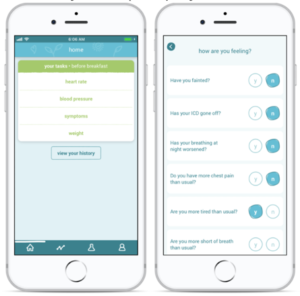A Canadian app is helping keep heart failure patients healthy, and out of hospital. Known as Medly, the app is not only transforming care for the one million Canadians living with heart failure, but also reducing the burden on emergency departments.
In its simplest form, heart failure describes a heart that doesn’t pump blood as well as it should. This could be the result of a condition like high blood pressure that weakens the heart over time, leaving patients struggling to cope with everyday activities.
Although there is no cure for heart failure, treatments and lifestyle changes can make a real difference. But patients need close monitoring to ensure they stay healthy, and out of hospital.
Now, an app developed at Toronto’s University Health Network is helping do just that.
The app, Medly, collects data on patient symptoms and heart health. Each morning users enter their blood pressure, weight and heart rate. They also answer a series of yes or no questions about their symptoms: Are you feeling fatigued today? Are your ankles swollen?
Medly, collects data on patient symptoms and heart health. Each morning users enter their blood pressure, weight and heart rate. They also answer a series of yes or no questions about their symptoms: Are you feeling fatigued today? Are your ankles swollen?
Then, clinically-validated algorithms analyze the information, looking for subtle changes that could indicate potential problems. Almost instantly, the user gets feedback. That feedback might be confirmation that everything is normal, or a message instructing the user to take a prescribed medication or contact their care provider.
At the same time, the app sends data to the clinical care team, alerting them to anything untoward. But does it work?
To find out, a team led by Patrick Ware of University Health Network’s eHealth Innovation group and Emily Seto, Assistant Professor at the University of Toronto and Affiliate Scientist at Techna, studied 315 heart failure patients from the Peter Munk Cardiac Centre in Toronto.
Over the course of a year, the participants spent six months following their normal care plan. Then, the research team introduced the app, and the results were dramatic.
By outsourcing monitoring, Medly helps clinicians spot and address urgent cases within minutes of a patient entering their data.
“We found that use of Medly reduced heart failure-related hospitalizations by half,” explains Ware. Not only that, the researchers also saw a 24% reduction in all-cause hospitalizations, as well as improvements in patient heart health, well-being and self-care.
The researchers stress that Medly is intended to complement clinical visits, not replace them. And far from generating extra work, the app could help a single nurse manage up to 350 patients.
Dr. Heather Ross, head of cardiology at the Peter Munk Cardiac Centre and co-developer of the app explains, “because the app better informs patients and clinical staff of health status changes, and does so instantly, patients receive the right care at the right time — this is a transformational change.”








































